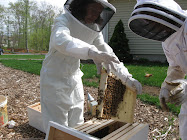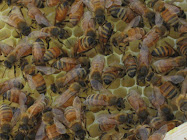It occurred to me awhile ago that the only way to drink tea responsibly is to buy is loose tea. Usually I purchase our coffee at The Coffee Exchange on Wickenden Street in Providence. The owner was selling and roasting "fair trade" coffee long before it was a buzz word. He has also invested in the families living in the region by creating his own organization Coffee Kids.
While I'm waiting for my coffee, I've been noticing the loose tea that they sell there. They don't sell a lot of it, but they sell the basics. When another customer strolled in and ordered a bag of black tea, I started to feel . . . guilty. All of you tea drinkers out there, go and take a look at your pantry. See all of those boxes and individually wrapped tea bags? (granted, not all of ours are individually wrapped) Not very environmentally responsible. Whenever I purchase anything (especially food) I look at the packaging and deliberately avoid things that are bagged, boxed and then wrapped in plastic! (I'm an specifically thinking about those chip snack packs you buy at Walmart or Shaw's.) Think about all of the wasted energy and raw materials (or worse, chemicals to make the plastic) that went into all of that packaging. Think about all of the recycling you'll have to do. Think about how much of it isn't recyclable and will end up in the dump.
So, when I was out of Peppermint Tea, I went to the Coffee Exchange and purchased some loose tea. This enormous jar of tea cost $4.80 . Wow. Nice savings -- on several levels!

My Mom gave my sister-in-law and I these fabulous little single serving tea pots. The interior is lined with a fine screen that prevents the loose tea from being poured into your cup. It's also very easy to make another pot with the same leaves -- yes, you will still get a nice pot of tea.
There are several types of tea pots that work nicely for loose tea. When I was in China everyone had a glass tea pot with a basket that set inside, then on the top there was a plunger that looked and worked just like a french press coffee pot. The Japanese restaurant we sometimes go to simply uses a fine strainer over your mug of tea that they remove before bringing it to your table. Then, of course you have the metal balls and such -- which are okay, but a little bit cumbersome. You do have to clean out your tea pot rather than just dumping the bag into the trash (or better yet, your compost!). But really, we can handle that, can't we? We use a French Press Coffee Pot at home. Not only does it make fabulous coffee, but it is glass (not plastic) and we don't have to spend money on coffee filters. All of these things add up. Before you realize it, you'll notice that you spend less time at the grocery store / Walmart / Target and save. Incidentally, coffee grounds are great in your compost! If you don't have a compost, you can sprinkle them around any acid loving plant -- like blueberry bushes!
Since we are talking about tea, let me tell you about my 2nd Honey Bee class last night. First, our class has grown. We are all jammed into an Agricultural High School classroom -- all thirty of us, along with the large assortment of teachers. I am amazed at the commitment the teachers have to the aspiring bee keepers. Most of them are men, bringing in all kinds of supplies to show us, putting in a ton of thought into the classes with a PowerPoint presentation and even a syllabus. It seems like there's no place they'd rather be than cultivating future bee keepers and answering all of their random questions. You really get the feeling you could call these guys up at any hour of the day with a bee emergency and they'd walk you through it like they have nothing they'd rather be doing -- and maybe that's just it. Our teachers are happy bee keepers. They are in awe of the honey bee, and rightly so. Honey Bees are amazing.
- Do you know that the Queen (of which there is typically only one per hive) lives 2-5 years and in her lifetime only has one mating flight where she mates with 7-15 drones (the males that do nothing but mate and eat honey) then stores the sperm and uses them to create eggs. Amazing.
- After the mating season (spring) the Drones just hang out and eat honey. By July / August the Worker Bees (the gals) have kicked the Drones out of the hive and they die of exposure. Our teacher says you'll see the poor rejected dudes laying on the ground by the hive.
- There are about 5-7 guard bees at the entrance to the hive (these are the ones that will sting you if you threaten the hive aggressively ... no the whole hive doesn't come out and attack, fyi) These Guard Bees stand at the entrance and check every bee that goes in and out of the hive to make sure that intruders (like a yellow jacket) stay out. The funny thing is, if a honey bee from a different hive comes and tries to get in, they will reject the honey bee -- unless that bee is carrying nectar and honey in which they say "Come on in Honey!" Smart little bees.
I'll close by showing you a picture of Ripley doing Yoga. The other day he got my matte out and said he wanted to do some Yoga. So, I got my package of Yoga cards out and he did various poses one by one -- trying his best to duplicate what he saw on the card. Too cute. Honestly.







































